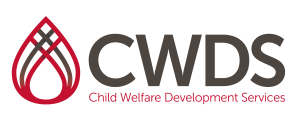CWDS Curriculum
Attachment, Development and Therapeutic Parenting
Level: Advanced Practice – Lineworker
Credits: 6
Intended Audience: This is an advanced class for child welfare workers, particularly those working in permanent placement or adoptions. Child welfare workers attending will develop an awareness, understanding and application of Attachment, Development, and Therapeutic Parenting. They will also understand how trauma affects attachment and development in children
Intended Objectives:
- The trainee will be able to assess the strength of child-parent attachment
- The trainee will understand how removal and placement affect attachment
- The trainee will be able to identify elements of case plans to enhance attachment
- The trainee will be able to facilitate and assess visitation attachment activities
- The trainee will be able to identify services to enhance/repair attachment
Topics Include:
- An overview of Attachment Parenting and how attachment forms and is compromised by out-of-home placements
- An overview of Developmental Parenting and how traumatized children often miss developmental milestones
- An overview of Therapeutic Parenting and the role of the caregivers
- The language of Therapeutic Parenting and Attachment Parenting
- What do children in out-of-home care need from their caregivers
- How learning about Attachment Development and Therapeutic Parenting will affect their practice
CalSWEC Competencies Addressed:
1.2 The trainee will demonstrate the ability to conduct an ethnically and culturally sensitive assessment of a child and family and to develop an appropriate intervention plan
2.12 The trainee understands how attachment, separation, and placement affect a child and family, and how these experiences may influence a child’s physical, cognitive, social, and emotional development
2.13 The trainee understands the principles of concurrent and permanency planning
2.14 The trainee understands the importance of working together with biological families, foster families, and kin networks, involving them in assessment and
planning and helping them cope with special stresses and difficulties
2.19 The trainee is able to engage and assess families from a strengths-based “person in environment” perspective and to develop and implement a case plan based on this assessment
2.2 The trainee demonstrates the ability to assess the interaction of factors underlying abuse and neglect and the capacity to identify strengths that act to preserve the family and protect the child
Posted In:Permanency: Reunification, Foster Care and Adoptions



